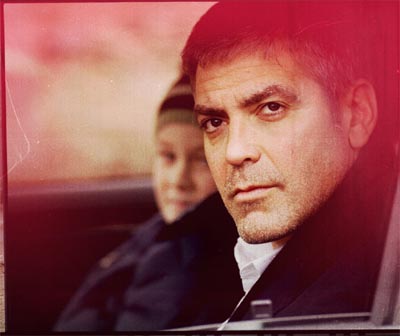Can you say “perfect film?” An existential tale of corporate corruption that plays like Greek tragedy crossed with Kafka. That’s Michael Clayton, the latest George Clooney cinematic encounter produced by a handful of gifted directors, written/directed by Tony Gilroy (who wrote all the “Bourne” films) and flawlessly cast.
Michael Clayton, the latest George Clooney cinematic encounter produced by a handful of gifted directors, written/directed by Tony Gilroy (who wrote all the “Bourne” films) and flawlessly cast.
Given Clooney’s remarkable presence, you enter the theater expecting slick, glamor and extreme urban style. What you get, thanks to the gritty intelligence of the entire filmic package, is a dreamlike membrane of loss, grit and greed whose central Everyman is an emotionally bruised company fixer for a New York corporate law firm.
Clooney is our era’s Marilyn Monroe. The camera adores him. It is impossible not to be drawn to his screen image, his brooding beauty — which is now tinged by enough middle-aged seediness to be haunting. The loss of Michael Clayton’s personal center echoes the threadbare quality of the northeast itself, and while never showy, the camerawork of Robert Elswit etches the disintegration just under the surface of humans, landscape and social networks gathered into this vivid film.
Smart and subtle, the film is a breathtaking indictment of greed and corruption whose thematic center sneaks up on us. We meet Clayton as he struggles to pay off a failed restaurant venture, stay close to his young son, and keep yet another important client out of the headlines. The head of the law firm, played with bristling, heavyweight intelligence by Sidney Pollack, is on the verge of a multi-billion dollar international merger — at the same time that another of the firm’s attorneys, played by a searing Tom Wilkinson, has apparently flipped out in a public display of delusional madness. Or has he? The rest of the film probes the corporate ugliness that Wilkinson’s character has uncovered and that sends Clooney/Clayton racing to connect the dots.
A 21st century version of The Firm without the broad satiric relief of a Gene Hackman, or Hal Holbrook, Michael Clayton will chill you right down to your DNA, and you will find yourself nodding and thinking about Halliburton, Monsanto, and the New World Order as you let yourself be engaged without let-up for two hours.
Clooney always makes it look as if he just got out of bed, pulled on something by Armani, got into his black Mercedes and hung out in a life that’s more interesting than anybody else’s. But there’s more here. He’s got talent, but it’s neither studied nor showy enough to get in the way. In Clayton Clooney simply embeds himself inside this marginal character – a guy who should have had it all. What he still has, is a sense of decency increasingly out of step with the legal slime around him.
The performances: Tilda Swinton is eerie and calmly out-of-control as legal counsel for a mammoth corporation poised for empire, or decline. Swinton works in the Vanessa Redgrave mode of complete honesty, charismatic while sacrificing every fetish of female chauvinism. As the firm’s attorney headed for breakdown, Tom Wilkinson is the oracle at Delphi. His paranoia barely covers the truth he’s accidentally stumbled upon. Every performance, every camera angle — New York looks rumpled, worn, authentic — even the roiling, abstract soundwork of the score by James Newton Howard — it all works to put you inside a web that tightens as the film unfolds.
Michael Clayton lives up to its hype, and then some. Clooney once again proves that he’s much more than just a pretty face. He could just be the smartest film producer around.

